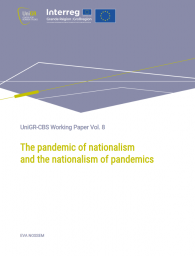Working Paper Vol. 8

In current times, the coronavirus is spreading and taking its toll all over the world. Inspite of having developed into a global pandemic, COVID-19 is oftentimes met with local national(ist) reactions. Many states pursue isolationist politics by closing and enforcing borders and by focusing entirely on their own functioning in this moment of crisis. This nationalist/nationally-oriented rebordering politics goes hand in hand with what might be termed ‘linguistic rebordering,’ i.e. the attempts of constructing the disease as something foreign-grown and by apportioning the blame to ‘the other.’ This paper aims at laying bare the interconnectedness of these geopolitical and linguistic/discursive rebordering politics. It questions their efficacy and makes a plea for cross-border solidarity.

